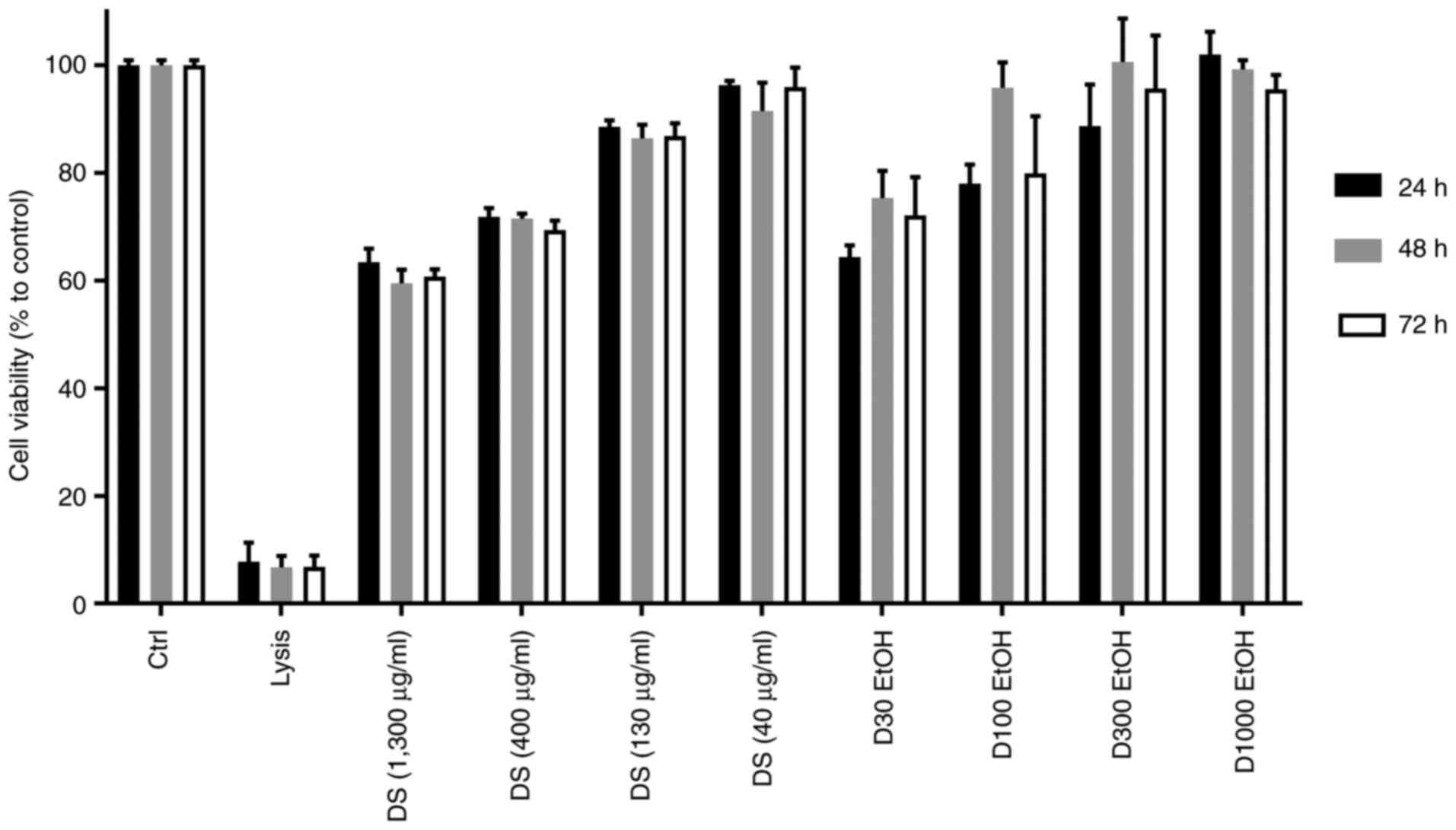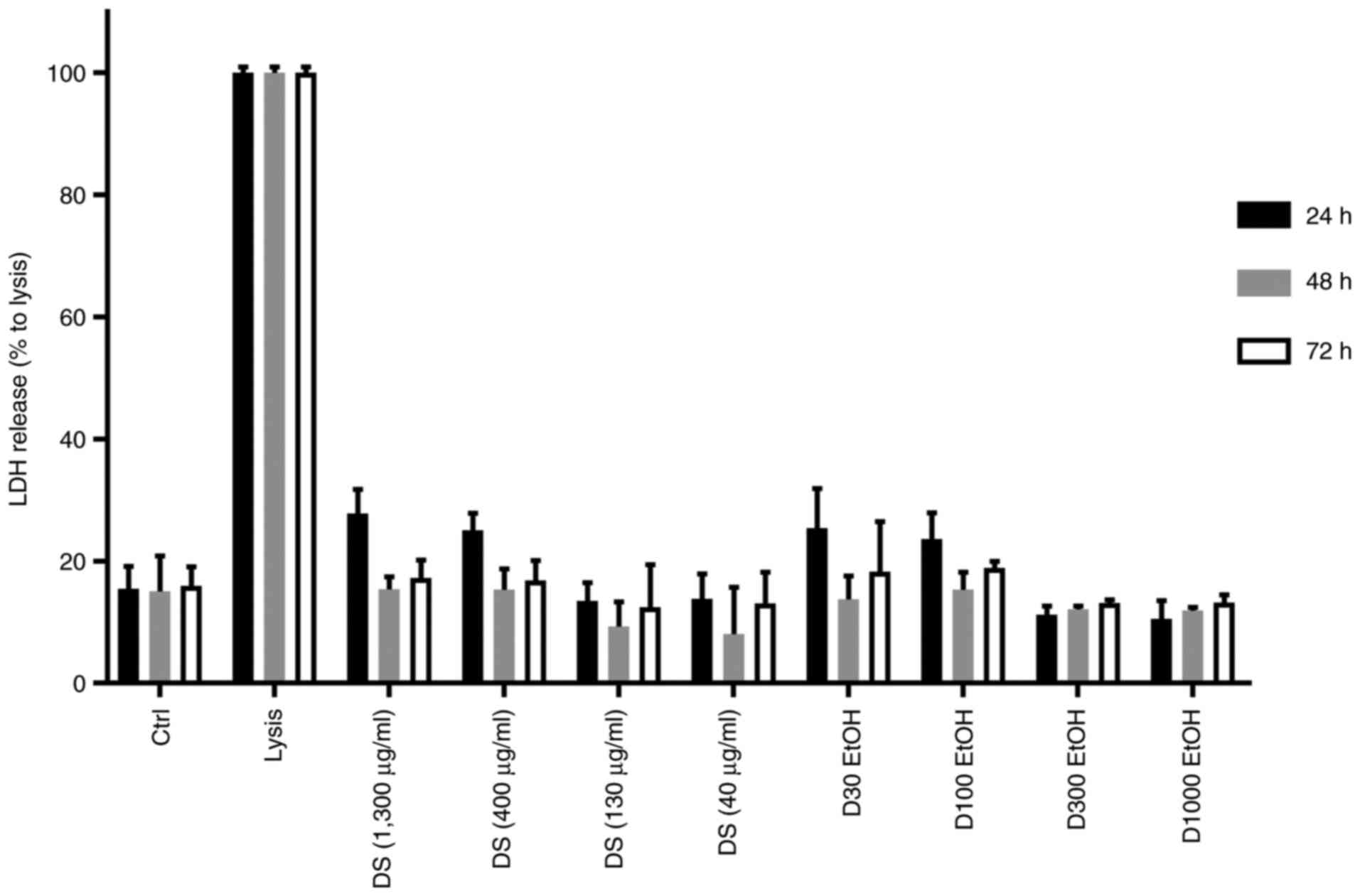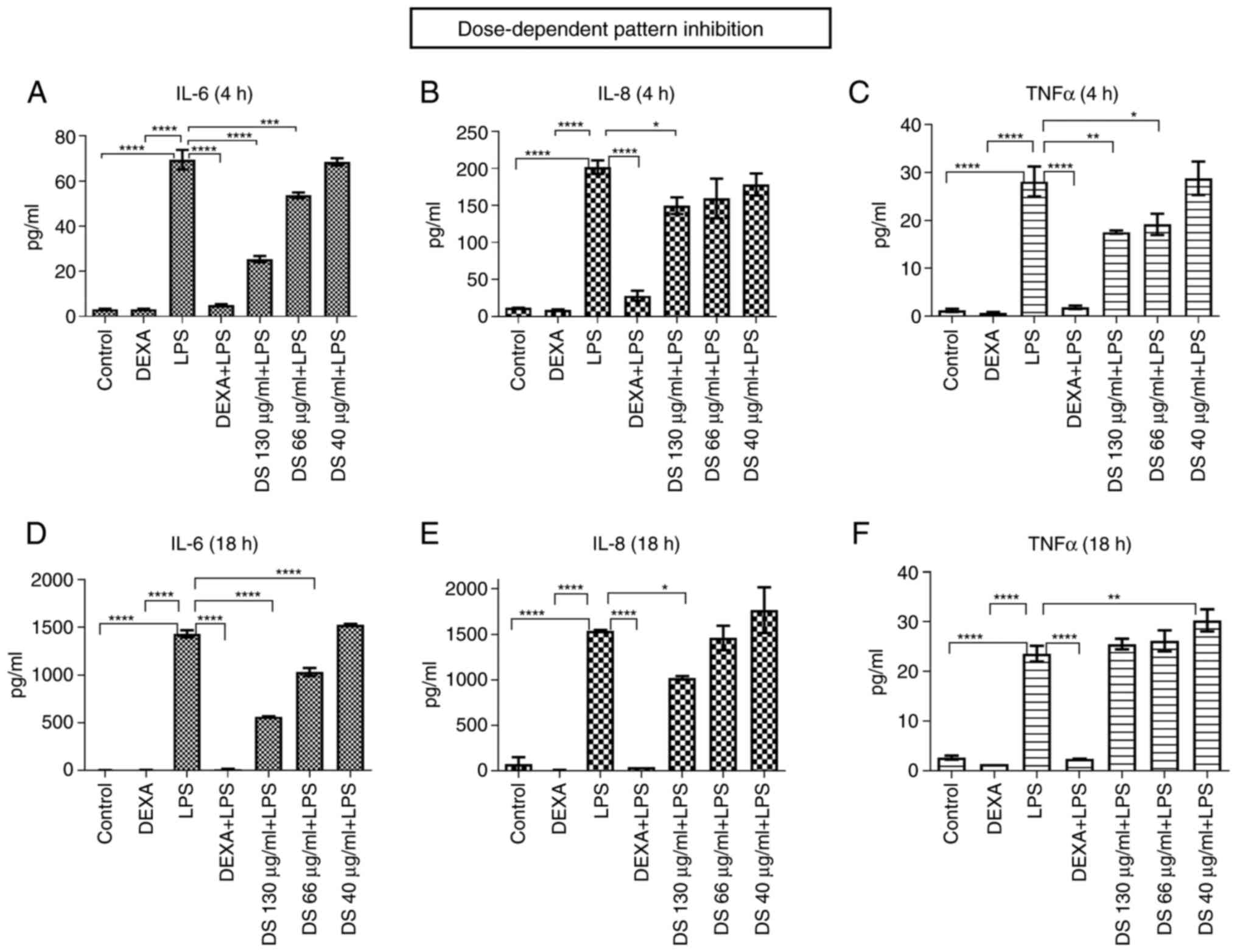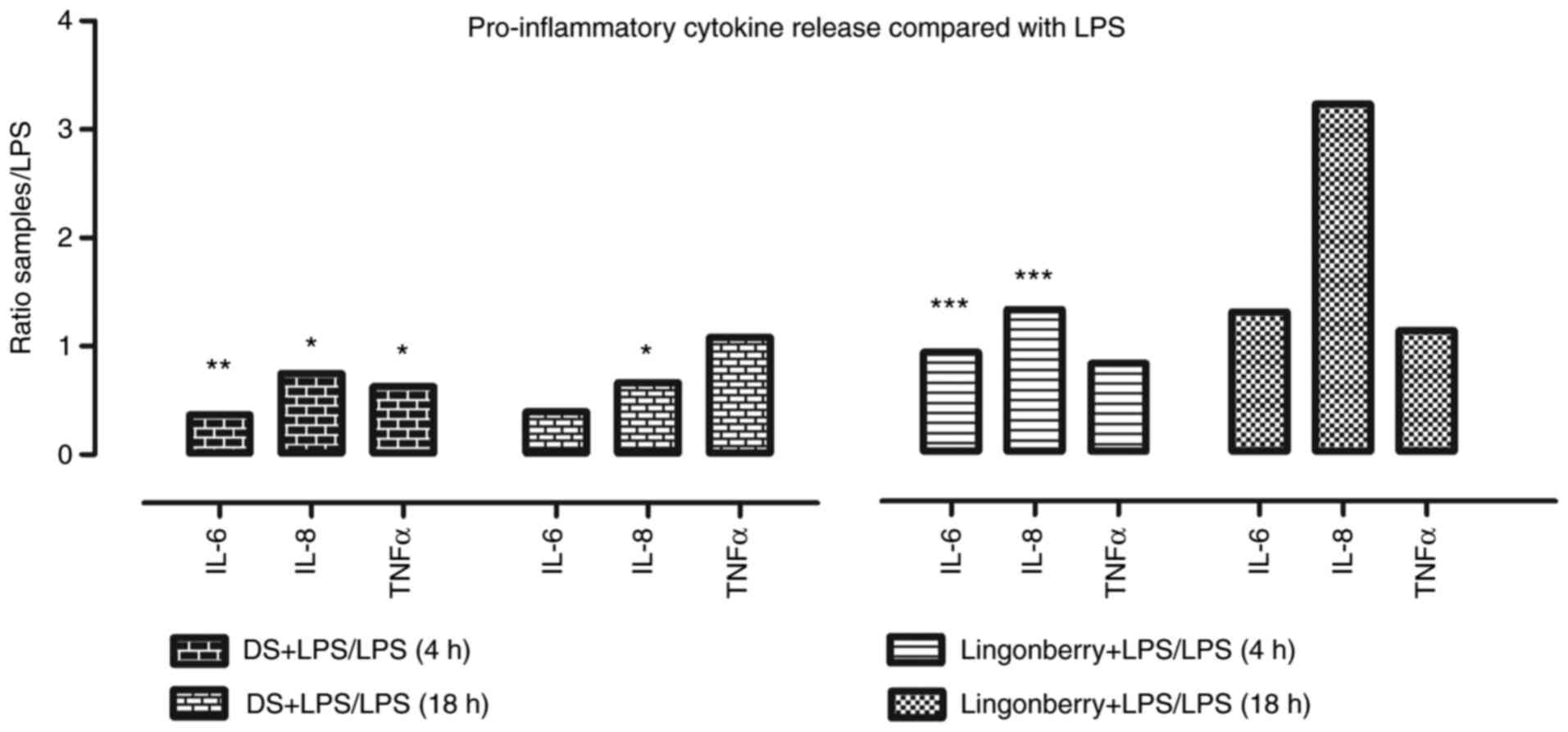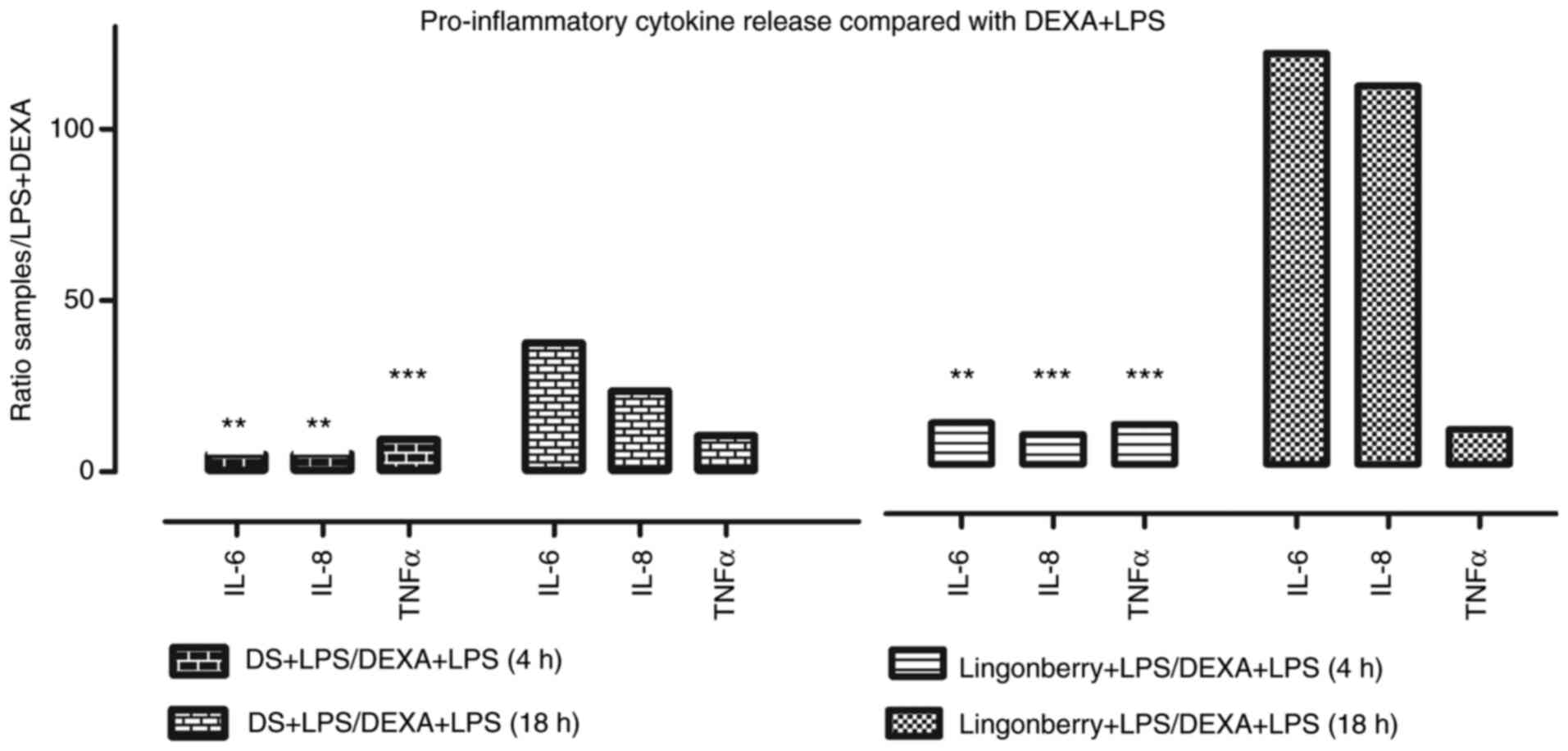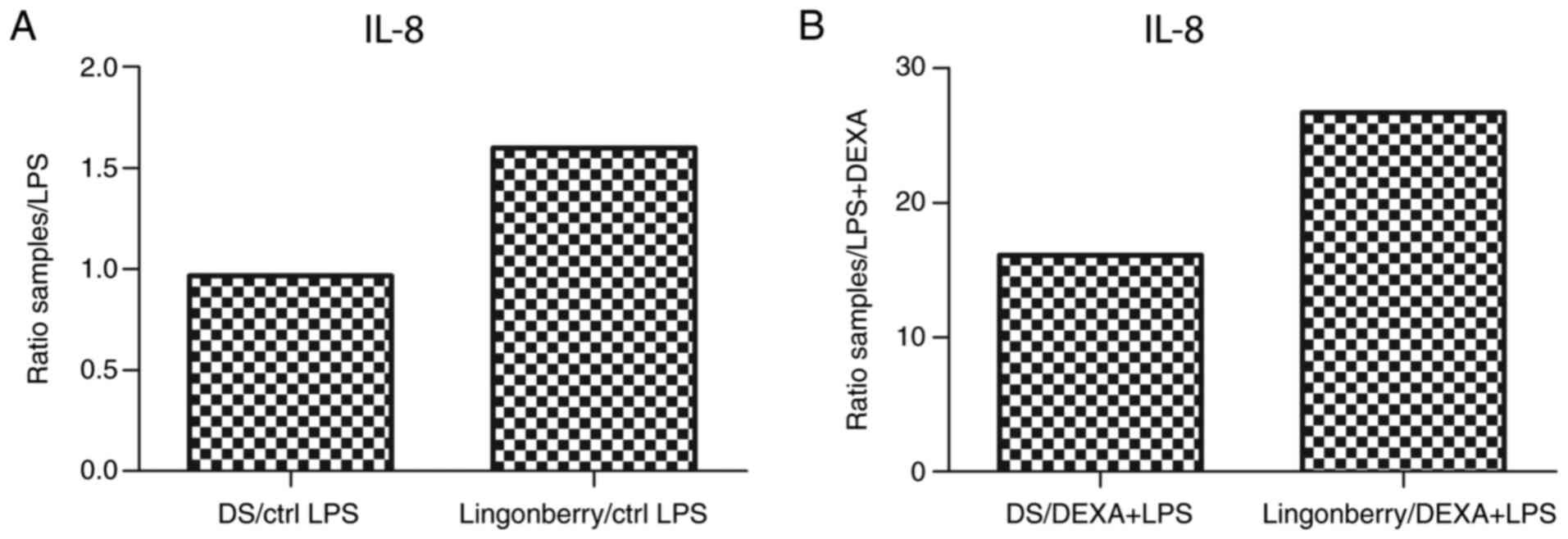|
1
|
Franceschi C and Campisi J: Chronic
inflammation (inflammaging) and its potential contribution to
age-associated diseases. J Gerontol A Biol Sci Med Sci. 69 (Suppl
1):S4–S9. 2014.PubMed/NCBI View Article : Google Scholar
|
|
2
|
Kotas ME and Medzhitov R: Homeostasis,
inflammation, and disease susceptibility. Cell. 160:816–827.
2015.PubMed/NCBI View Article : Google Scholar
|
|
3
|
Singh N, Baby D, Rajguru JP, Patil BP,
Thakkannavar SS and Pujari VB: Inflammation and Cancer. Ann Afr
Med. 18:121–126. 2019.PubMed/NCBI View Article : Google Scholar
|
|
4
|
Alfaddagh A, Martin SS, Leucker TM, Michos
ED, Blaha MJ, Lowenstein CJ, Jones SR and Toth PP: Inflammation and
cardiovascular disease: From mechanisms to therapeutics. Am J Prev
Med. 4(100130)2020.PubMed/NCBI View Article : Google Scholar
|
|
5
|
Peng C, Ouyang Y, Lu N and Li N: The NF-κB
signaling pathway, the microbiota, and gastrointestinal
tumorigenesis: Recent advances. Front Immunol.
11(1387)2020.PubMed/NCBI View Article : Google Scholar
|
|
6
|
Liu RH: Health-promoting components of
fruits and vegetables in the diet. Adv Nutr. 4:384S–392S.
2013.PubMed/NCBI View Article : Google Scholar
|
|
7
|
Slavin JL and Lloyd B: Health benefits of
fruits and vegetables. Adv Nutr. 3:506–516. 2012.PubMed/NCBI View Article : Google Scholar
|
|
8
|
Liu CH, Abrams ND, Carrick DM, Chander P,
Dwyer J, Hamlet MRJ, Macchiarini F, PrabhuDas M, Shen GL, Tandon P
and Vedamony MM: Biomarkers of chronic inflammation in disease
development and prevention: Challenges and opportunities. Nat
Immunol. 18:1175–1180. 2017.PubMed/NCBI View
Article : Google Scholar
|
|
9
|
Nunes CDR, Barreto Arantes M, Menezes de
Faria Pereira S, Leandro da Cruz L, de Souza Passos M, Pereira de
Moraes L, Vieira IJC and Barros de Oliveira D: Plants as sources of
anti-inflammatory agents. Molecules. 25(3726)2020.PubMed/NCBI View Article : Google Scholar
|
|
10
|
Boda D, Negrei C, Arsene A, Caruntu C,
Lupuleasa D and Ion RM: Spectral and photochemical properties of
hyperbranched nanostructures based on gardiquimod and
tpps4. Farmacia. 63:218–23. 2015.
|
|
11
|
Joseph SV, Edirisinghe I and
Burton-Freeman BM: Fruit polyphenols: A review of anti-inflammatory
effects in humans. Crit Rev Food Sci Nutr. 56:419–444.
2016.PubMed/NCBI View Article : Google Scholar
|
|
12
|
Li Y, Kong D, Fu Y, Sussman MR and Wu H:
The effect of developmental and environmental factors on secondary
metabolites in medicinal plants. Plant Physiol Biochem. 148:80–89.
2020.PubMed/NCBI View Article : Google Scholar
|
|
13
|
Zaynab M, Fatima M, Abbas S, Sharif Y,
Umair M, Zafar MH and Bahadar K: Role of secondary metabolites in
plant defense against pathogens. Microb Pathog. 124:198–202.
2018.PubMed/NCBI View Article : Google Scholar
|
|
14
|
Ryyti R, Hamalainen M, Peltola R and
Moilanen E: Beneficial effects of lingonberry (Vaccinium
vitis-idaea L.) supplementation on metabolic and inflammatory
adverse effects induced by high-fat diet in a mouse model of
obesity. PLoS One. 15(e0232605)2020.PubMed/NCBI View Article : Google Scholar
|
|
15
|
Drozdz P, Seziene V, Wojcik J and
Pyrzynska K: Evaluation of bioactive compounds, minerals and
antioxidant activity of lingonberry (Vaccinium vitis-idaea
L.) fruits. Molecules. 23(53)2017.PubMed/NCBI View Article : Google Scholar
|
|
16
|
Kowalska K and Olejnik A: Current evidence
on the health-beneficial effects of berry fruits in the prevention
and treatment of metabolic syndrome. Curr Opin Clin Nutr Metab
Care. 19:446–452. 2016.PubMed/NCBI View Article : Google Scholar
|
|
17
|
Mane C, Loonis M, Juhel C, Dufour C and
Malien-Aubert C: Food grade lingonberry extract: Polyphenolic
composition and in vivo protective effect against oxidative stress.
J Agric Food Chem. 59:3330–3339. 2011.PubMed/NCBI View Article : Google Scholar
|
|
18
|
Kivimäki AS, Siltari A, Ehlers PI, Korpela
R and Vapaatalo H: Lingonberry juice negates the effects of a high
salt diet on vascular function and low-grade inflammation. J Funct
Foods. 7:238–245. 2014.
|
|
19
|
Huang N, Rizshsky L, Hauck C, Nikolau BJ,
Murphy PA and Birt DF: Identification of anti-inflammatory
constituents in Hypericum perforatum and Hypericum gentianoides
extracts using RAW 264.7 mouse macrophages. Phytochemistry.
72:2015–2023. 2011.PubMed/NCBI View Article : Google Scholar
|
|
20
|
Birt DF, Widrlechner MP, Hammer KD,
Hillwig ML, Wei J, Kraus GA, Murphy PA, McCoy J, Wurtele ES,
Neighbors JD, et al: Hypericum in infection: Identification of
anti-viral and anti-inflammatory constituents. Pharm Biol.
47:774–782. 2009.PubMed/NCBI View Article : Google Scholar
|
|
21
|
Hammer KD, Hillwig ML, Solco AK, Dixon PM,
Delate K, Murphy PA, Wurtele ES and Birt DF: Inhibition of
prostaglandin E(2) production by anti-inflammatory hypericum
perforatum extracts and constituents in RAW264.7 mouse macrophage
cells. J Agric Food Chem. 55:7323–7331. 2007.PubMed/NCBI View Article : Google Scholar
|
|
22
|
Aazza S, Lyoussi B, Megias C,
Cortés-Giraldo I, Vioque J, Figueiredo AC and Miguel MG:
Anti-oxidant, anti-inflammatory and anti-proliferative activities
of Moroccan commercial essential oils. Nat Prod Commun. 9:587–594.
2014.PubMed/NCBI
|
|
23
|
Oliveira JR, de Jesus Viegas D, Martins
APR, Carvalho CAT, Soares CP, Camargo SEA, Jorge AOC and de
Oliveira LD: Thymus vulgaris L. extract has antimicrobial
and anti-inflammatory effects in the absence of cytotoxicity and
genotoxicity. Arch Oral Biol. 82:271–279. 2017.PubMed/NCBI View Article : Google Scholar
|
|
24
|
Alqarni AM, Niwasabutra K, Sahlan M,
Fearnley H, Fearnley J, Ferro VA and Watson DG: Propolis exerts an
anti-inflammatory effect on PMA-differentiated THP-1 cells via
inhibition of purine nucleoside phosphorylase. Metabolites.
9(75)2019.PubMed/NCBI View Article : Google Scholar
|
|
25
|
Shamilov AA, Bubenchikova VN, Chernikov
MV, Pozdnyakov DI and Garsiya ER: Vaccinium vitis-idaea L: Chemical
contents, pharmacological activities. Pharm Sci. 26:344–362.
2020.
|
|
26
|
International Organization for
Standardization (ISO): Determination of substances characteristic
of green and black tea. Part 1: Content of total polyphenols in
tea. Colorimetric method using Folin-Ciocalteu reagent. ISO
14502-1:2005. ISO, Geneva, 2005. https://www.iso.org/standard/31356.html. Accessed
March, 2005.
|
|
27
|
Romanian Pharmacopoeia Commission National
Medicines Agency: Cynarae folium Monography. In: Romanian
Pharmacopoeia. 10th edition. Medical Publishing House, Bucharest,
pp334-335, 2008.
|
|
28
|
Apak R, Guclu K, Ozyurek M, Karademir SE
and Altun M: Total antioxidant capacity assay of human serum using
copper(II)-neocuproine as chromogenic oxidant: The CUPRAC method.
Free Radic Res. 39:949–961. 2005.PubMed/NCBI View Article : Google Scholar
|
|
29
|
European Directorate for the Quality of
Medicines & HealthCare: Crataegi fructus Monography. In:
European Pharmacopoeia. 9th edition. EDQM, Strasbourg, pp1384-1385,
2016.
|
|
30
|
Deshmukh SS, Katare YS, Shyale SS, Bhujbal
SS, Kadam SD, Landge DA, Shah DV and Pawar JB: Isolation and
evaluation of mucilage of adansonia digitata linn as a suspending
agent. J Pharm (Cairo). 2013(379750)2013.PubMed/NCBI View Article : Google Scholar
|
|
31
|
International Organization for
Standardization (ISO): Biological evaluation of medical devices.
Part 12: Sample preparation and reference materials. ISO
10993-10912, 2012. ISO, Geneva 2012. https://www.iso.org/standard/75769.html.
|
|
32
|
International Organization for
Standardization (ISO): Biological evaluation of medical devices.
Part 5: Tests for in vitro cytotoxicity. ISO 10993-10995, 2009.
ISO, Geneva, 2009. https://www.iso.org/standard/36406.html.
|
|
33
|
Chan FK, Moriwaki K and De Rosa MJ:
Detection of necrosis by release of lactate dehydrogenase activity.
Methods Mol Biol. 979:65–70. 2013.PubMed/NCBI View Article : Google Scholar
|
|
34
|
Fujiwara N and Kobayashi K: Macrophages in
inflammation. Curr Drug Targets Inflamm Allergy. 4:281–286.
2005.PubMed/NCBI View Article : Google Scholar
|
|
35
|
Dinkova-Kostova AT, Cheah J, Samouilov A,
Zweier JL, Bozak RE, Hicks RJ and Talalay P: Phenolic Michael
reaction acceptors: Combined direct and indirect antioxidant
defenses against electrophiles and oxidants. Med Chem. 3:261–268.
2007.PubMed/NCBI View Article : Google Scholar
|
|
36
|
Maleki SJ, Crespo JF and Cabanillas B:
Anti-inflammatory effects of flavonoids. Food Chem.
299(125124)2019.PubMed/NCBI View Article : Google Scholar
|
|
37
|
Zălaru C, Crişan C, Călinescu I, Moldovan
Z, Tarcomnicu I, Litescu S, Tatia R, Moldovan L, Boda D and Iovu M:
Polyphenols in Coreopsis tinctoria Nutt. fruits and the plant
extracts antioxidant capacity evaluation. Cent Eur J Chem.
12:858–867. 2014.
|
|
38
|
Madduma Hewage S, Prashar S, Debnath SC, O
K and Siow YL: Inhibition of inflammatory cytokine expression
prevents high-fat diet-induced kidney injury: Role of lingonberry
supplementation. Front Med (Lausanne). 7(80)2020.PubMed/NCBI View Article : Google Scholar
|
|
39
|
Kowalska K, Olejnik A, Zielińska-Wasielica
J and Olkowicz M: Inhibitory effects of lingonberry (Vaccinium
vitis-idaea L.) fruit extract on obesity-induced inflammation
in 3T3-L1 adipocytes and RAW 264.7 macrophages. J Funct Foods.
54:371–380. 2019.
|
|
40
|
Hurkova K, Uttl L, Rubert J, Navratilova
K, Kocourek V, Stranska-Zachariasova M, Paprstein F and Hajslova J:
Cranberries versus lingonberries: A challenging authentication of
similar Vaccinium fruit. Food Chem. 284:162–170. 2019.PubMed/NCBI View Article : Google Scholar
|
|
41
|
Kylli P, Nohynek L, Puupponen-Pimia R,
Westerlund-Wikström B, Leppänen T, Welling J, Moilanen E and
Heinonen M: Lingonberry (Vaccinium vitis-idaea) and European
cranberry (Vaccinium microcarpon) proanthocyanidins:
Isolation, identification, and bioactivities. J Agric Food Chem.
59:3373–3384. 2011.PubMed/NCBI View Article : Google Scholar
|
|
42
|
Ek S, Kartimo H, Mattila S and Tolonen A:
Characterization of phenolic compounds from lingonberry
(Vaccinium vitis-idaea). J Agric Food Chem. 54:9834–9842.
2006.PubMed/NCBI View Article : Google Scholar
|
|
43
|
Braakhuis A: Evidence on the Health
benefits of supplemental propolis. Nutrients.
11(2705)2019.PubMed/NCBI View Article : Google Scholar
|
|
44
|
Zhao L, Pu L, Wei J, Li J, Wu J, Xin Z,
Gao W and Guo C: Brazilian green propolis improves antioxidant
function in patients with type 2 diabetes mellitus. Int J Environ
Res Public Health. 13(498)2016.PubMed/NCBI View Article : Google Scholar
|















